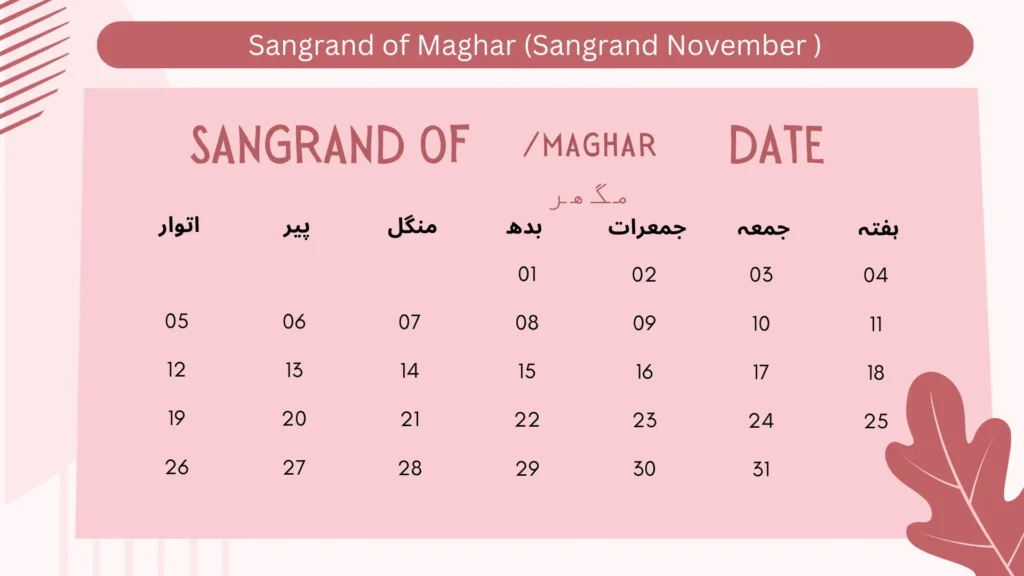Sangrand of Maghar in November According to the Nanakshahi Samvat Calendar
On November 14, it is the Sangrand of Maghar. On this day, Sikhs celebrate the day of Sangrand of Maghar, as it is known in Bara Maha Manghair.
You can view the list of all Sangrand dates for each month in the current year. You can also see the English calendar dates for Sangrand in January, February, March, April, May, June, July, August, September, October, and December for the current year.

Teachings of Guru Arjan Dev Ji during the Sangrand of Maghar
TAN SRI Guru Arjan Dev Sahib Ji has given us a teaching to follow during the Sangrand of Maghar or in this month of Maghar:
Shabad and Its Meaning
Manghair Mahe Suhhandiyah Harpair Sang Bathariha
(ਮੱਘਰ ਮਹਿ ਸੁਹੰਡੀਅਹ ਹਰਿ ਪਾਇਰ ਸੰਗਿ ਬਹਤਾਰਿਹਾ
“Those who are genuinely blessed sit with their beloved Lord in this month.”)
Who Are the Suhhandiyah?
During the Sangrand of Maghar or in this month of Maghar, “Suhhandiyah” (ਸੁਹੰਡੀਅਹ, “glorious ones”) are those who have true glory, those who are famed. These individuals are renowned and possess true glory in the month of Maghar. Haripair Sang Bathariyaha (ਹਰਿ ਪਾਇਰ ਸੰਗਿ ਬਹਤਾਰਿਹਾ) means to sit with our beloved Lord, Hari, Akal Purakh Waheguru (ਹਰੀ ਅਕਾਲ ਪੁਰਖ ਵਾਹਿਗੁਰੂ, “The Timeless Being”). Those who sit with our beloved Lord Akal Purakh Waheguru are the ones who are glorified and who have true blessings in this month.
Gaining Blessings and Glory during Sangrand of Maghar
So, how do we gain those blessings? How do we achieve that glory? We have to sit with our beloved Akal Purakh Waheguru. Now we know our form, the form of Akal Purakh Waheguru on this earth, is through the Shabad.
The Role of Shabad
Sabad Gurbira Geher Gambira
Bin Sabde Jagabawranang
(ਸਬਦੁ ਗੁਰਬੀਰ ਗਹਿਰ ਗੰਭੀਰ
ਬਿਨੁ ਸਬਦੇ ਜਗੁ ਬਉਰਾਨਾ
“The Word is the deep and profound Guru; without the Word, the world goes insane.”)
The Shabad is our Guru, our Peer (ਪੀਰ, “guide”). Still, they also are Gurb Parmeshar Akojan (ਗੁਰੁ ਪਰਮੇਸ਼ਰ ਅਕੋਜਨ, “Guru is the Creator”)—our Guru is also the form of Parmeshar (ਪਰਮੇਸ਼ਰ, “Supreme Being”), Akal Purakh Waheguru. Think of them as the same.
The Bani as Narankar
Waho Waho Bani Narankar Hai Tis Jeved Awarna Koi
(ਵਾਹੋ ਵਾਹੋ ਬਾਣੀ ਨਿਰੰਕਾਰ ਹੈ, ਤਿਸੁ ਜੈਵਡੁ ਅਵਰੁ ਨ ਕੋਈ
“Hail, hail, the Word is the formless Lord; none is as great as He.”)
This great Bani, Tis Turgi Bani Aai Tis Sagali Chantamitai (ਤਿਸੁ ਤੁਰਗੀ ਬਾਣੀ ਆਈ, ਤਿਸੁ ਸਗਲੀ ਛੰਤ ਮਿਲਾਈ, “Through this exalted Word, all peace is obtained”) — this exalted Bani is the form of Narankar (ਨਿਰੰਕਾਰ, “formless Lord”) on this earth. They are the Shabad Surupe (ਸ਼ਬਦ ਸਰੂਪ, “embodiment of the Word”) of Akal Purakh Waheguru on this earth. So physically, we can sit with them when we go into the Sadh Sangat (ਸਾਧ ਸੰਗਤਿ, “company of the holy”).
When we go to the Gurdwara and sit in the Sadh Sangat, we are in the sanctuary of our Guru, Siri Guru Granth Sahib Ji. We are sitting in the sanctuary of the Guru Khalsa, and there we sit and share in their glory. As we sit in their presence, we gain those blessings and are part of the glory of Akal Purakh Waheguru.
The Importance of Sangat during the Sangrand of Maghar
Physical Aspect
During the Sangrand of Maghar or in this month of Maghar, one critical teaching is, in the physical sense, to do as much Sangat (ਸੰਗਤਿ, “company”) of Siri Guru Granth Sahib Ji and Guru Khalsa as possible because it is through them that we gain our blessings.
Which Sangat Harpab Vasah JiYo
*(ਵਿਚਿ ਸੰਗਤਿ ਹਰਿ ਪ੍ਰਭੁ ਵਸੈ ਜੀਉ,
“In the Sangat, the Lord resides, O soul.”)
Within the Sangat, Sangat Hari Akal Purakh Waheguru resides. So, that is a physical way of sitting with Akal Purakh Waheguru, our beloved husband Lord, During the Sangrand of Maghar or in this month of Maghar.
Deeper Meaning
But further still, if we take a deeper meaning, to sit with Akal Purakh Waheguru is to have complete focus and attention on Akal Purakh Waheguru when we are meditating on Guru Shabad, when we are meditating on Guru Bani, when we are singing Keertan (ਕੀਰਤਨ, “devotional music”), whether we are in the Sadh Sangat or our own homes doing it individually. Sitting with Akal Purakh Waheguru during the Sangrand of Maghar or in this month means having proper focus and a mindset where everything else is removed. Our steadfast focus, correct mindset, and concentration are only with and only on Akal Purakh Waheguru.
Understanding the Mind’s Focus
Now scholars have described the mind’s Berthia(ਬਰਤਿਆ, “focus”) as the mindset of the mind. They have classified these into five different forms:
Types of Berthia
1. Parman
Parman (ਪਰਮਾਣ, “mindset of perception”) is the mindset when we are caught up in things that we see. For instance, if we go for a walk, we might see big houses, fast cars, the clothes people wear, and the different people and their appearances. We become engrossed in what our eyes are seeing. Suppose we have this Berthia, Parman Berthia. In that case, we lose focus from Akal Purakh Waheguru because we are caught up in what we see. We must avoid this Berthia because it leads us away from the pure concentration on Akal Purakh Waheguru.
2. Viparjay
Viparjay (ਵਿਪਰਜਯ, “contradictory mindset”) is the mindset when we go against the teachings of our beloved Akal Purakh Waheguru. The teachings say that this world is false, an illusion, and that the only truth in all creation is the form of Waheguru within it. Waheguru exists in every particle of the creation and even outside of it.
If we have a Viparjay mindset, we go against that teaching and believe this world to be actual. We don’t think it to be Maya (ਮਾਇਆ, “illusion”)—materialistic and false—that one day will end. Instead, we might believe it’s here forever. We might even think that God is untrue, that Waheguru is false. If we have that mindset, it will not allow us to sit with our beloved Lord.
3. Nindra
Nindra (ਨਿੰਦ੍ਰਾ, “sleep”) translates to sleep or sleepiness. In the same way that we are caught up in the illusion when we have Viparjay and purposely go against the teachings of our Guru, when we are in this Nindra mindset, we don’t even know the actual teachings; we are asleep to those teachings.
We are caught up in what is called Avidya (ਅਵਿਦਿਆ, “ignorance”), which is Maya, the illusion, materialism. We don’t even think of Waheguru, let alone go against those teachings, as in the mindset of Viparjay. So, if we are in Nindra, we are asleep in this materialistic illusion and utterly detached from Waheguru, making it impossible to focus on Waheguru.
4. Vikalap
Vikalap (ਵਿਕਲਪ, “imaginative thoughts”) occurs if we start doing that Simran (ਸਿਮਰਨ, “remembrance”), Bhajan (ਭਜਨ, “devotional singing”), and concentration. Still, we focus on the fruits of meditation for materialistic wants. Some of us, when meditating, might think of gaining a promotion, passing exams, or losing diseases, thus focusing on the physical, materialistic benefits of doing that meditation, Nam Simran (ਨਾਮ ਸਿਮਰਨ, “meditation on God’s name”), and concentration. This is called Vikalap Berthia, where the mindset focuses on materialistic fruits rather than the Kushia (ਖੁਸ਼ੀਆਂ, “joys”) — the happiness and oneness with our beloved Lord.
5. Simrati
The final type of Berthia is Simrati(ਸਿਮਰਤੀ, “remembrance”), which means to remember past events or good experiences. When we start remembering things we’ve done in the past, like good times from our youth, these memories can also distract us from our beloved Lord.
Achieving True Focus on Waheguru during Sangrand of Maghar
These five types of Berthia, these mindsets, take us away from our beloved Lord. What we want is a Virti (ਵਿਰਤੀ, “practice”) of complete focus and attention on Akal Purakh Waheguru, not thinking of anything physical, worldly, or related to Maya. Our steadfast focus and attention should be on Waheguru when we focus on Shabad. In that way, we sit with Waheguru.
Attaining Glory and Blessings
Manghair Mahe Suhhandiyah Harpair Sang Bathariha
(ਮੱਘਰ ਮਹਿ ਸੁਹੰਡੀਅਹ ਹਰਿ ਪਾਇਰ ਸੰਗਿ ਬਹਤਾਰਿਹਾ
“Those who are truly blessed sit with their beloved Lord in this month.”)
Then, in Mangar Mahesh Swandhya (ਮੰਗਰ ਮਹਿ ਸਵੰਧਿਆ, “this month of Maghar”), we will be glorified, we will gain those blessings, and we will have the opportunity to become one with the Almighty Lord.
